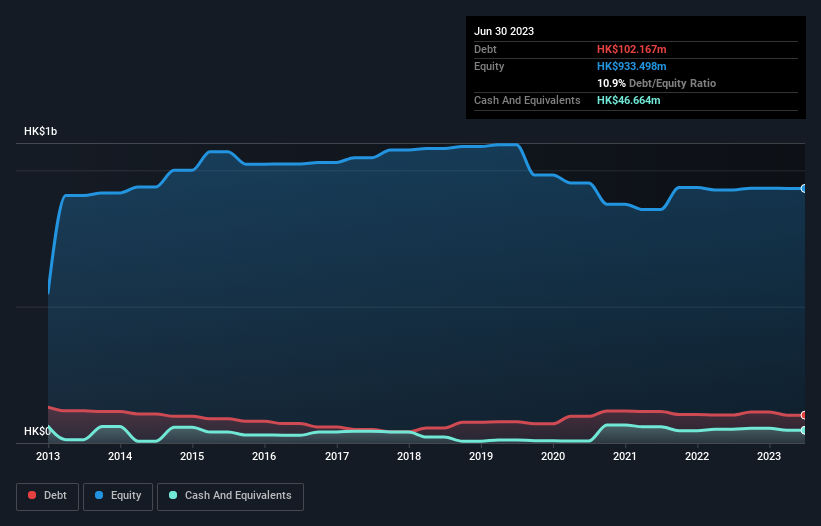
Warren Buffett famously said, 'Volatility is far from synonymous with risk.' When we think about how risky a company is, we always like to look at its use of debt, since debt overload can lead to ruin. We can see that Wing Lee Property Investments Limited (HKG:864) does use debt in its business. But should shareholders be worried about its use of debt?
Why Does Debt Bring Risk?
Debt assists a business until the business has trouble paying it off, either with new capital or with free cash flow. Part and parcel of capitalism is the process of 'creative destruction' where failed businesses are mercilessly liquidated by their bankers. However, a more usual (but still expensive) situation is where a company must dilute shareholders at a cheap share price simply to get debt under control. Of course, the upside of debt is that it often represents cheap capital, especially when it replaces dilution in a company with the ability to reinvest at high rates of return. The first step when considering a company's debt levels is to consider its cash and debt together.
See our latest analysis for Wing Lee Property Investments
How Much Debt Does Wing Lee Property Investments Carry?
As you can see below, Wing Lee Property Investments had HK$102.2m of debt, at June 2023, which is about the same as the year before. You can click the chart for greater detail. However, it does have HK$46.7m in cash offsetting this, leading to net debt of about HK$55.5m.

A Look At Wing Lee Property Investments' Liabilities
The latest balance sheet data shows that Wing Lee Property Investments had liabilities of HK$102.8m due within a year, and liabilities of HK$12.1m falling due after that. Offsetting these obligations, it had cash of HK$46.7m as well as receivables valued at HK$746.0k due within 12 months. So its liabilities outweigh the sum of its cash and (near-term) receivables by HK$67.5m.
This is a mountain of leverage relative to its market capitalization of HK$76.5m. Should its lenders demand that it shore up the balance sheet, shareholders would likely face severe dilution.
We measure a company's debt load relative to its earnings power by looking at its net debt divided by its earnings before interest, tax, depreciation, and amortization (EBITDA) and by calculating how easily its earnings before interest and tax (EBIT) cover its interest expense (interest cover). Thus we consider debt relative to earnings both with and without depreciation and amortization expenses.
Wing Lee Property Investments's debt is 2.9 times its EBITDA, and its EBIT cover its interest expense 5.1 times over. Taken together this implies that, while we wouldn't want to see debt levels rise, we think it can handle its current leverage. If Wing Lee Property Investments can keep growing EBIT at last year's rate of 14% over the last year, then it will find its debt load easier to manage. There's no doubt that we learn most about debt from the balance sheet. But it is Wing Lee Property Investments's earnings that will influence how the balance sheet holds up in the future. So when considering debt, it's definitely worth looking at the earnings trend. Click here for an interactive snapshot.
Finally, a company can only pay off debt with cold hard cash, not accounting profits. So we clearly need to look at whether that EBIT is leading to corresponding free cash flow. During the last three years, Wing Lee Property Investments generated free cash flow amounting to a very robust 90% of its EBIT, more than we'd expect. That puts it in a very strong position to pay down debt.
Our View
When it comes to the balance sheet, the standout positive for Wing Lee Property Investments was the fact that it seems able to convert EBIT to free cash flow confidently. But the other factors we noted above weren't so encouraging. For instance it seems like it has to struggle a bit to handle its total liabilities. Looking at all this data makes us feel a little cautious about Wing Lee Property Investments's debt levels. While we appreciate debt can enhance returns on equity, we'd suggest that shareholders keep close watch on its debt levels, lest they increase. When analysing debt levels, the balance sheet is the obvious place to start. However, not all investment risk resides within the balance sheet - far from it. For instance, we've identified 3 warning signs for Wing Lee Property Investments (1 makes us a bit uncomfortable) you should be aware of.
When all is said and done, sometimes its easier to focus on companies that don't even need debt. Readers can access a list of growth stocks with zero net debt 100% free, right now.
Valuation is complex, but we're here to simplify it.
Discover if Wing Lee Property Investments might be undervalued or overvalued with our detailed analysis, featuring fair value estimates, potential risks, dividends, insider trades, and its financial condition.
Access Free AnalysisHave feedback on this article? Concerned about the content? Get in touch with us directly. Alternatively, email editorial-team (at) simplywallst.com.
This article by Simply Wall St is general in nature. We provide commentary based on historical data and analyst forecasts only using an unbiased methodology and our articles are not intended to be financial advice. It does not constitute a recommendation to buy or sell any stock, and does not take account of your objectives, or your financial situation. We aim to bring you long-term focused analysis driven by fundamental data. Note that our analysis may not factor in the latest price-sensitive company announcements or qualitative material. Simply Wall St has no position in any stocks mentioned.
About SEHK:864
Wing Lee Property Investments
An investment holding company, engages in the property investment business in Hong Kong.
Adequate balance sheet and slightly overvalued.

